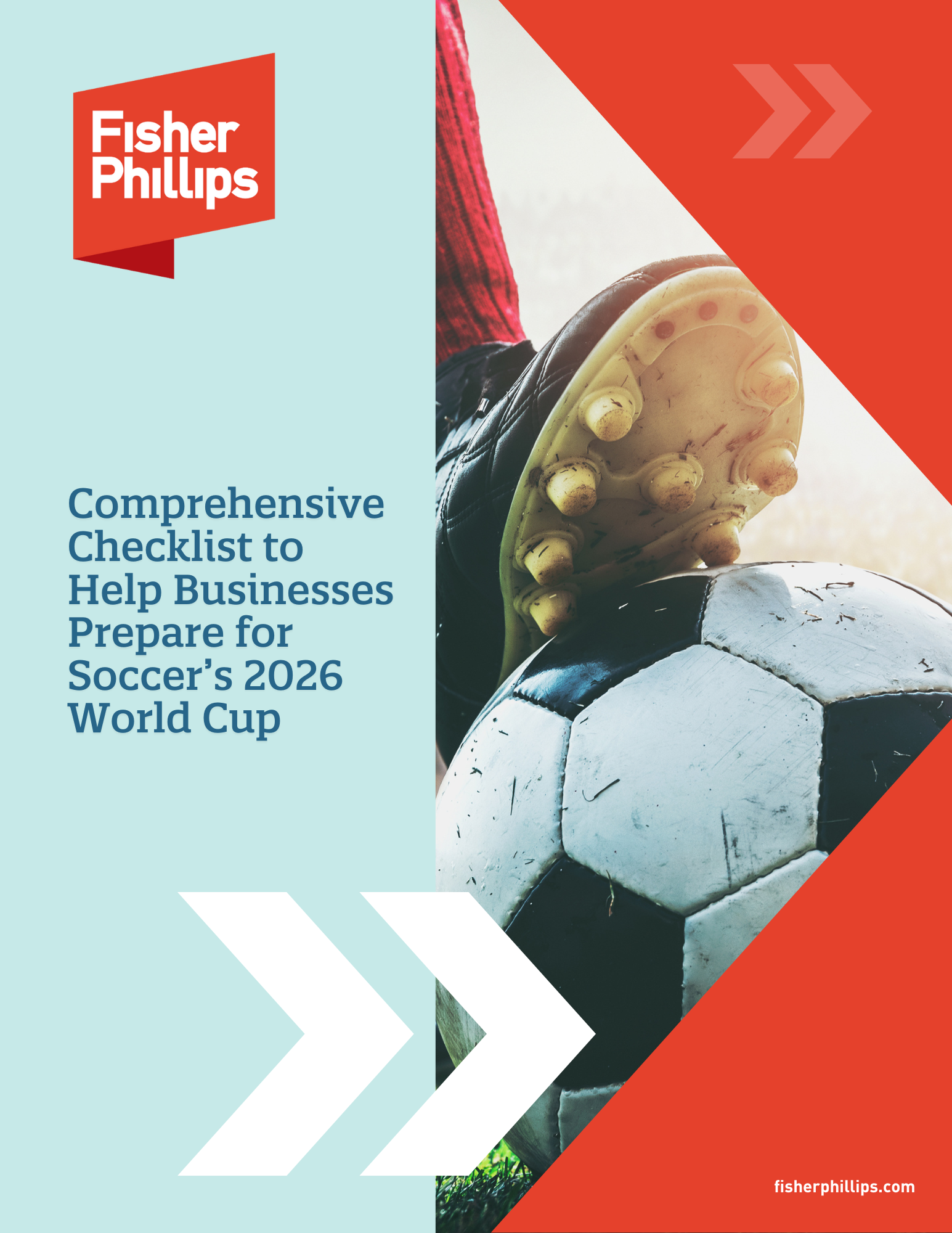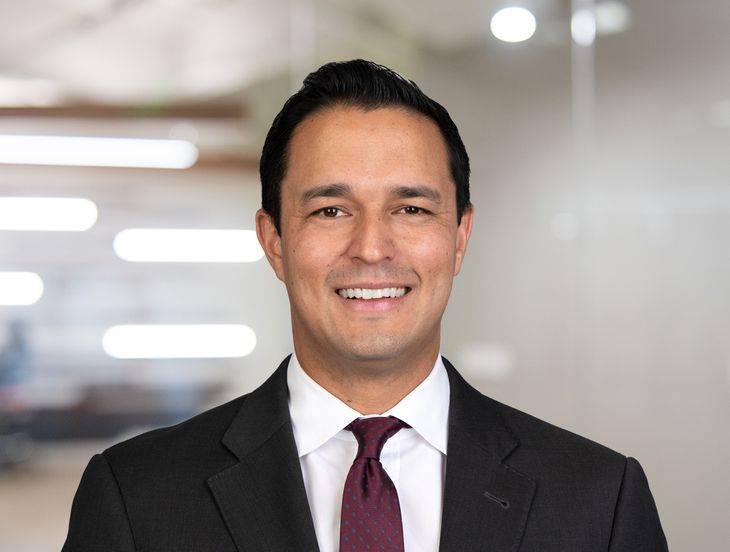Comprehensive Checklist to Help Businesses Prepare for Soccer’s 2026 World Cup
Insights
1.09.25
Visitors from around the world will descend on the U.S., Mexico, and Canada next year as the three countries jointly host FIFA's 2026 World Cup -- and your business might want to start preparing already. It’s being billed as the largest sporting event in history, with millions of visitors pouring into 16 local markets over the course of five weeks, which means there will be plenty of challenges and opportunities for your business. You might think the event will be meaningless to your organization or that you won’t even feel its impact, but a quick review of our comprehensive checklist will open your eyes to the many facets you need to start thinking about now.
Click on the photo below to access the checklist in a full graphic format.
The Details
If you’re not familiar, the world’s best international soccer teams play in a month-long tournament every four years to hoist one of the world’s most desirable trophies.
- The 2026 edition will be the largest ever, with 48 teams (expanded from 32) playing in a total of 104 games (increased from 64).
- The tournament will take place between June 11 and July 19.
- The following 16 cities will host matches (number of matches hosted in parentheses): Dallas (9), NY/NJ (8), Atlanta (8), Los Angeles (8), Houston (7), Boston (7), Miami (7), Philadelphia (6), San Francisco area (6), Kansas City (6), Seattle (6), Toronto (6), Mexico City (5), Vancouver (5), Guadalajara (4), and Monterrey (4).
- The final will take place in NY/NJ on July 19, and the two semifinal matches will be held in Atlanta and Dallas.
- As of now, we know that Mexico will play its three group stage games in Mexico City (2) and Guadalajara; Canada will play in Vancouver (2) and Toronto; and the U.S. will play in Los Angeles (2) and Seattle.
- We will learn where the other countries will play their group stage matches in late 2025.
Comprehensive Checklist of Considerations
As you begin your preparations for the World Cup, here are considerations you should keep in mind – especially if you have operations in any of the host cities.
Staffing Needs
___ What are our projected staffing requirements leading up to and during the World Cup period?
___ Do we need to hire temporary or contingent workers to meet increased demand, and how will we recruit them?
___ Do we need to hire temporary staff with specific foreign language skills? How can we leverage existing multilingual staff to better serve international visitors?
___ What training programs should we implement to prepare staff for an international audience?
___ Do we understand the legal standards in place for whether we can retain unpaid volunteers at our organization?
___ Are our current staff schedules flexible enough to accommodate extended hours or shift changes?
___ What incentives can we offer to attract and retain both temporary and standard employees during this period?
___ How will we manage employee workload to prevent burnout during peak times?
___ Do we have a plan for rapid onboarding of new workers to get them up to speed quickly?
___ What policies do we need to review or update regarding overtime, leave requests, and scheduling?
Business Disruption
___ How will increased traffic and road closures impact our operations and customer access?
___ Do we need to adjust our operating hours to accommodate event schedules and visitor patterns?
___ What logistics plans are in place to ensure timely deliveries and supply chain continuity?
___ How will public transportation changes affect our employees’ ability to get to work?
___ What contingency plans do we have for potential disruptions like power outages or network failures?
___ Are we prepared for fluctuations in demand, both sudden spikes and unexpected lulls?
___ How can we communicate effectively with customers and staff about operational changes?
___ Do we need to arrange alternative parking or transportation options for customers and employees?
___ What strategies can we implement to mitigate the impact of disruptions on our business?
___ How will we monitor and respond to real-time events that could affect our operations?
Wage and Hour Considerations
___ Are we compliant with federal, state, and local minimum wage laws, especially if we plan to adjust pay rates during the World Cup?
___ Have we reviewed the current minimum wage requirements in our jurisdiction, including any scheduled increases?
___ How will increased overtime hours affect our payroll, and are we prepared to compensate employees accordingly?
___ Do we need to reclassify any employees from exempt to non-exempt status (or vice versa) based on their duties during the event?
___ Are we adhering to legal requirements for meal and rest breaks, especially during extended shifts?
___ How will we compensate employees for mandatory training or meetings related to World Cup preparations?
___ Are there specific wage and hour laws applicable to temporary or seasonal workers that we need to consider?
___ Do we need to implement shift differentials or premium pay for night shifts, weekends, or holidays during the event?
___ How will we handle compensation for on-call time or employees waiting to be engaged during peak periods?
___ Are we prepared to comply with regulations regarding maximum working hours – especially with regard to minor workers – to prevent employee fatigue and potential legal issues?
Other Workplace Issues
___ How will we address potential workplace distractions related to the World Cup (such as watching games during work hours)?
___ Should we provide designated areas or times for employees to watch matches?
___ Do we need to update our policies on personal device usage during work hours?
___ Are there legal considerations regarding workplace gambling that we need to address?
___ What is our policy on employees participating in office pools or gambling related to the event? Should we host our own free office pool with company-provided prizes?
___ Do we have procedures for handling increased leave requests during the World Cup period? Do we want to offer company holidays on days of certain key games?
___ How can we balance employee engagement with productivity during the event?
___ How will we manage potential conflicts arising from team rivalries among staff?
___ What support can we offer employees who may be overwhelmed by the increased workload?
___ How can we use the World Cup as an opportunity for team building and employee morale?
Security and Workplace Safety
___ What security measures should we put in place to ensure the safety of customers and employees during the event?
___ Do we need to hire additional security personnel or engage with security firms?
___ How will we manage crowd control within and around our premises?
___ Are our emergency response plans updated and have they been communicated to all staff?
___ What training do employees need for handling potential security incidents or emergencies – with a specific focus on preventing and diffusing altercations between customers?
___ How can we coordinate with local law enforcement and emergency services for support?
___ Do we have adequate surveillance systems in place, and are they functioning properly?
___ What protocols are in place for reporting and addressing security concerns?
___ How will we handle lost and found items, especially important documents like passports?
___ Are our facilities compliant with safety regulations, including fire codes and occupancy limits?
Immigration
___ Do we plan to hire foreign workers, and what are the visa requirements for them?
___ What are our obligations if we sponsor foreign employees, including costs and legal responsibilities?
___ How will we verify the work authorization and eligibility of all employees, including temporary and foreign staff?
___ Are we familiar with the process and timeline for obtaining necessary work visas or permits?
___ How do we ensure compliance with immigration laws when working with international contractors and vendors?
___ What policies are in place to manage cross-border travel for our employees during the event?
___ Do we need to provide immigration assistance or resources to foreign staff members?
___ How will potential changes in immigration policy leading up to the event affect our staffing plans?
___ Are our HR staff trained to handle immigration documentation and compliance issues?
___ What contingency plans are in place if a foreign employee’s visa application is delayed or denied?
Data Privacy
___ Which data privacy regulations are applicable to our business during the World Cup (e.g., GDPR, CCPA)?
___ How will we obtain proper consent for data collection from international customers?
___ If we will be transacting business with customers outside the U.S., are modifications necessary to existing privacy policies in order to make them transparent and accessible – especially to non-native speakers?
___ Do we have secure systems in place for cross-border data transfers in compliance with international laws?
___ What measures are we taking to protect personal data from unauthorized access or breaches?
___ Is our data encryption up to industry standards for both data at rest and in transit?
___ How will we handle data subject requests, such as access or deletion requests, from international visitors?
___ Do we need to update our data retention policies in light of increased data collection?
___ Do we need to revisit the application of data minimization principles to increased data collected in connection with the World Cup?
___ What training do employees need regarding data privacy, handling sensitive information, and responding to data subject access requests?
Local Engagement
___ How can we collaborate with World Cup organizers and local partners to enhance our business offerings?
___ Are there sponsorship or partnership opportunities available with local event organizers?
___ Can we participate in or sponsor official fan zones or events to increase our visibility?
___ What local regulations or requirements must we comply with when collaborating with organizers?
___ How can we support community initiatives related to the World Cup?
___ Are there networking events or business forums associated with the event that we should attend?
___ How can we leverage relationships with other local businesses for mutual benefit during the event?
___ What promotional opportunities are available through official World Cup channels?
___ How can we contribute to ensuring a positive experience for visitors in our city?
___ Do we need to coordinate with organizers regarding security, logistics, or other operational aspects?
Enhanced Customer Experiences for Guests, Including International Visitors
___ What services can we offer to cater specifically to international visitors – and especially those from the specific countries whose teams will be playing in our area?
___ Do we need to provide multilingual support or materials in multiple languages?
___ How can we incorporate cultural sensitivity into our customer service practices?
___ Are we prepared to accept various international payment methods?
___ What amenities or facilities can we offer to enhance the guest experience (e.g., Wi-Fi, charging stations)?
___ Can we provide information or assistance regarding local attractions and transportation?
___ Should we consider offering certain complimentary or discounted services for local volunteers or official World Cup workers?
___ Do we have feedback mechanisms in place to quickly address customer concerns or suggestions?
___ What training do staff need to better serve a diverse, global clientele?
___ How can we create memorable experiences that encourage repeat business or positive reviews?
Leveraging Marketing and Promotion
___ What marketing strategies can we implement to capitalize on the World Cup excitement?
___ How can we promote our business without infringing on FIFA’s intellectual property rights?
___ Are we aware of the legal restrictions on using official logos, trademarks, and the term
“World Cup”?
___ Can we create themed promotions or events that align with the spirit of the event legally?
___ How can we use social media to engage with potential customers during the World Cup?
___ Are there opportunities to collaborate with influencers or ambassadors who are connected to the event?
___ What advertising channels will be most effective in reaching both local and international audiences?
___ How can we measure the effectiveness of our marketing efforts during the event?
___ Do we need to adjust our branding or messaging to resonate with a global audience?
___ What partnerships can we form to amplify our marketing reach without violating IP laws?
Supply Chain Demands
___ How will increased demand impact our inventory levels, and how can we prepare accordingly?
___ Are our suppliers capable of scaling up to meet our needs during the World Cup?
___ Do we need to source additional or alternative suppliers to ensure continuity?
___ What logistics plans are in place to handle potential delays or disruptions in the supply chain?
___ Can we implement inventory management systems to optimize stock levels and reduce waste?
___ How can we collaborate with suppliers to forecast demand more accurately?
___ Are there import/export considerations or tariffs that could affect our supply chain?
___ What contingency plans do we have for critical supply shortages?
___ How will we manage perishable goods or time-sensitive materials during peak periods?
___ Can we negotiate better terms or bulk pricing with suppliers due to increased volume?
Tech Upgrades
___ Do our payment systems support international transactions and multiple currencies?
___ What cybersecurity measures are in place to protect against increased threats during the event?
___ Is our website and online infrastructure capable of handling higher traffic volumes?
___ Do we need to upgrade our point-of-sale systems to be more efficient or user-friendly?
___ How can technology improve our operational efficiency during the World Cup?
___ Are we compliant with Payment Card Industry (PCI) standards and other relevant regulations?
___ What IT support will we need to maintain system uptime and address technical issues promptly?
___ Can we leverage technologies like mobile apps or QR codes to enhance customer engagement?
___ How will we back up critical data and ensure business continuity in case of system failures?
___ Do we need to implement or update customer relationship management (CRM) systems for better service?
Accommodating Guests with Special Needs
___ Are our facilities – especially temporary structures and those newly constructed for the event – accessible to guests with disabilities (e.g., wheelchair ramps, accessible restrooms)?
___ Do we provide services for guests with visual or hearing impairments (e.g., Braille menus, sign language support)?
___ What training do staff need to assist guests with special needs effectively and respectfully?
___ How can we communicate our accessibility features to potential visitors?
___ Do we comply with all legal requirements regarding accessibility in our region?
___ Can we offer special accommodations or services for elderly guests or those with mobility issues?
___ How will we handle dietary restrictions or food allergies in our offerings?
___ Are there technologies we can implement to improve accessibility (e.g., assistive listening devices)?
___ Have we considered the religious needs for our guests that could make their stay more welcoming (e.g., dietary restrictions, offering services at different times of day or on different days of the week)?
___ How can we go beyond compliance to create an inclusive and welcoming environment for all guests?
Data Analytics/AI for Organizational Decision-Making
___ What data analytics tools can we use to forecast demand and optimize our operations?
___ How can AI help us personalize marketing efforts to different customer segments, especially international guests?
___ Do we have the capability to analyze customer behavior and preferences in real-time?
___ How can data analytics improve our staffing schedules and resource allocation?
___ What metrics will we track to measure performance during the World Cup?
___ Are our data analytics practices compliant with data privacy regulations?
___ Can predictive analytics help us identify and mitigate potential risks?
___ How will we visualize and report data to inform decision-making quickly?
___ Do we need to invest in new technologies or expertise to leverage AI effectively?
___ How can we use insights gained during the World Cup to improve future operations?
Sustainability
___ What sustainable practices can we implement during the World Cup to reduce our environmental impact?
___ Can we source products locally to support the community and act more sustainably?
___ How can we minimize waste through recycling or composting programs?
___ Are there opportunities to use renewable energy sources or improve energy efficiency?
___ How can we communicate our sustainability efforts to customers and stakeholders?
___ Do we need to train staff on sustainable practices and policies?
___ Can we obtain green certifications or partner with environmental organizations?
___ What sustainable products or services can we offer to eco-conscious customers?
___ How will we measure and report on our sustainability performance during the event?
___ What long-term sustainability initiatives can we implement that extend beyond the World Cup?
Capitalizing on Post-Event Opportunities
___ How can we retain new customers gained during the World Cup for future business?
___ What strategies can we implement to maintain the momentum generated by the event?
___ Can we collect customer feedback to improve our products or services post-event?
___ How will we analyze the data gathered during the World Cup to inform future decisions?
___ Are there partnerships or relationships formed during the event that we can continue to develop?
___ What marketing campaigns can we launch to keep our brand top-of-mind after the event?
___ How can we evaluate our performance to identify strengths and areas for improvement?
___ Do we need to adjust our business plans based on insights gained during the World Cup?
___ What lessons learned can be documented to prepare for future large-scale events?
___ How can we continue to engage with the community and visitors after the event concludes?
Conclusion
We will continue to develop resources to support businesses as the World Cup approaches, so we recommend you sign up for our Fisher Phillips Insight Service to ensure you receive direct and timely updates. If you have questions, please contact the authors of this Insight, your Fisher Phillips attorney, or any attorney in our various relevant groups: Sports Industry, PEO/Staffing, Hospitality, Wage and Hour, Workplace Safety, Immigration, International, Privacy and Cyber, Leaves and Accommodations, and AI/Data/Analytics.
Related People
-
- Benjamin M. Ebbink
- Partner
-
- Todd B. Scherwin
- Regional Managing Partner
-
- Adam F. Sloustcher
- Regional Managing Partner
-
- Lauren M. Sobaski
- Partner
Service Focus
- AI, Data, and Analytics
- Employee Leaves and Accommodations
- Immigration
- International
- Privacy and Cyber
- Wage and Hour
- Workplace Safety and Catastrophe Management








